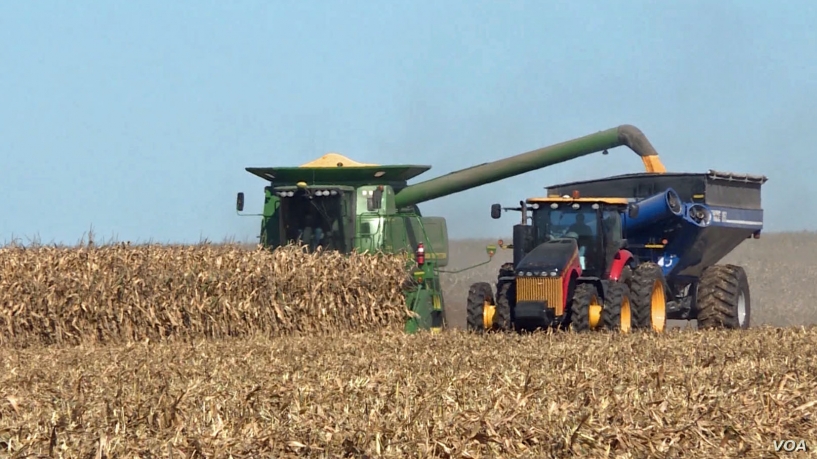GLORIA TREVI PROTAGONIZÓ UNO DE LOS MOMENTOS MÁS EMOTIVOS DE PREMIO LO NUESTRO 2026

US Farmers Harvest Amid Trade, Impeachment Uncertainty
VOA News By Kane Farabaugh
CAMERON, ILL. – A sunny and warm October day outside Coleman, Illinois, is a welcome sight for farmer Jared Kunkle, who is eager to begin harvesting corn and soybean crops.
Inclement weather has been a problem this growing season, as he explained to a group of farmers from Brazil who recently visited the area.
“When I tell them we’ve had a half a day to work in May, they are just blown away,” Kunkle said. “We had a half of day … in the entire month of May to plant.”
That’s because many parts of the Midwest United States experienced continuous soaking rain during prime planting season, forcing many farmers to put seeds into the ground late, or in some instances, not at all.
“This is the second field I planted,” Kirkwood, Illinois, farmer Wendell Shauman said. “I got done with this field and I didn’t plant for a month. I finished planting June 15th. I never planted that late before. This thing is an off the chart year, we’ve never seen anything like it. People talk about trying to do comparison years, there’s just nothing like this one.”
While Shauman and Kunkle begin harvesting fields of corn, both note that crops typically are brown and dry this time of year.

Today, many are still green and wet.
The problem, Kunkle said, is not knowing «what the weather is going to be like for the next month and a half, two months. That field right there won’t be harvested for another three or four weeks.”
Which means most farmers are in a race against time to get crops out before the frost and freeze arrives.
“It’s been one of those years,” Kunkle said. “Nothing in 2019 has been easy.”
“I think the word I would use is challenging,” Mark Gebhards, executive director of government affairs and commodities with the Illinois Farm Bureau, said.
Uncertainty extends beyond the weather. Farmers are also wondering what price their crops will fetch and where the fruits of their labor will go once harvested.
The answers depend in part on the outcome of thorny issues now in the hands of U.S. lawmakers and trade negotiators, Gebhards said. The sense that others hold the key to their livelihoods adds to the farmers’ anxiety.
Rather than focusing on those issues, Washington is captivated by an impeachment inquiry against President Donald Trump.
“The impeachment proceedings, unfortunately, come at the worst time for us in terms of getting the USMCA ratified, which is a must,” Gebhards said.
The fate of the United States-Mexico-Canada Trade Agreement (USMCA) has been stalled in the U.S. Congress more than 10 months since leaders of the nations signed the pact. The accord guarantees access to key markets for U.S. grain products and helps stabilize prices. Many farmers are concerned the impeachment inquiry will further delay ratification of the agreement.
“The deal is done,” farmer Shauman said. “You’ve got three countries that made a deal. I don’t understand what they’re doing now.”
The outcome of negotiations with China, currently locked in a trade war with the U.S., also looms.
“I support going against [confronting] China,” Shauman said. “They’ve been a bad actor against us for years. Was tariffs the right way to do it? I don’t know.”
Farmers, however, are clinging to signs of hope.
Trump has signaled that trade talks with China are productive. Japan and the United States recently signed a bilateral trade agreement. The Trump administration also announced proposals to ensure corn-based ethanol is included in the nations’ fuel supply. And prices for corn and soybeans are stabilizing.
“I think there will be opportunities to be profitable this year,” farmer Kunkle said. “But at the same time, we’ve tried to eliminate some expenses and kind of make sure that the equipment we’re using is what we need, not what we want.”
Kunkle said he needs a payout from the U.S. Department of Agriculture’s $16 billion dollar “market facilitation program,” which is helping farmers offset financial losses stemming from tariffs on crops. He dislikes having to rely on the program.
“It was a big help,” Shauman said. “When that first payment came out, we were glad to get it. There were bills it covered.”
Like most farmers, Shauman and Kunkle said they would prefer trade to aid.

